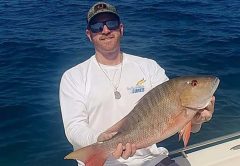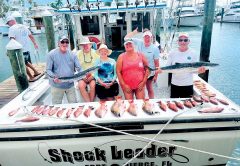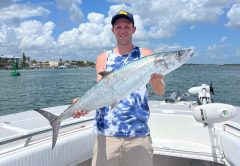
[dropcap]T[/dropcap]he recreational harvest season for snook opens on Feb. 1 in Florida’s Atlantic Coastal and inland waters (from the Miami-Dad/Monroe county line north), including Lake Okeechobee and the Kissimmee River. The season will remain open through May 31.
In the Atlantic, anglers may keep one snook per day that is not less than 28 or more than 32 inches total length, which is measured from the most forward point of the head with the mouth closed to the farthest tip of the tail with the tail compressed or squeezed while the fish is lying on its side. A snook permit is required to keep snook, along with a saltwater fishing license, unless the angler is exempt from the license requirements. Only hook-and-line gear is allowed when targeting or harvesting snook.
It is illegal to buy or sell snook.
Researchers ask anglers who harvest the fish to save their filleted carcasses and provide them to the FWC by dropping them off at a participating bait and tackle store. This program allows anglers to participate in the collection of data such as the size, age, maturity and sex of Florida’s premier inshore game fish, snook. For a county-by-county list, go to MyFWC.com/Research and click on “Saltwater,” “Snook,” and “Snook Anglers Asked to Help with Research.”
The harvest of snook in all of Florida’s Gulf of Mexico state waters, including Everglades National Park and all of Monroe County, remains closed until March 1. Snook harvested from the open waters of the Atlantic may not be transported through closed water or landed in the closed area. Anglers may catch and release snook during the closed season, but the FWC encourages anglers to handle and release these fish carefully to help ensure their survival upon release. Proper handling methods can help ensure the species’ abundance for anglers today and generations to come. To learn more about fish handling, visit MyFWC.com/Fishing and click on “Saltwater,” “Recreational Regulations” and “Fish Handling.”
For more information, visit MyFWC.com/Fishing and click on “Saltwater,” “Recreational Regulations” and “Snook.”
License Requirements: Snook permit and recreational fishing license.
Allowable Gear: Hook and line only.
| Atlantic (state and adjacent federal waters) | Gulf of Mexico, Monroe County, and Everglades National Park (state and adjacent federal waters) | |
| Closed Harvest Season | Dec. 15 – Jan. 31; June 1 – Aug. 31 | Dec. 1-end of February; may 1-Aug. 31 |
| Size Limit | Not less than 28″ total length (TL) or more than 32″ TL | Not less than 28” total length (TL) or more than 33” TL |
| Bag Limit | 1 per harvester per day | 1 per harvester per day |
Shoreline Fishing License FAQ
Who is required to have a valid shoreline fishing license with them?
Resident saltwater anglers who fish from shore or a structure affixed to shore will need to buy a shoreline fishing license unless they have a regular saltwater fishing license or are exempt.
Who is required to have a valid shoreline fishing license with them?
Resident saltwater anglers who fish from shore or a structure affixed to shore will need to buy a shoreline fishing license unless they have a regular saltwater fishing license or are exempt.
If I wade into the water to fish, will I no longer be covered by the shoreline license?
Anglers who wade into the water are considered to be fishing from shore as long as they can stand on the bottom.
If I ride in a boat to a fishing spot and then fish from shore, am I still covered by the shoreline license?
No. If an angler arrives at the fishing location by boat, he must have a regular saltwater fishing license, regardless of whether he fishes from shore.
Do nonresident anglers qualify for the shoreline license?
No. The shoreline fishing license is available to Florida residents only. Nonresident saltwater anglers must purchase a regular nonresident saltwater fishing license at $17 for three days, $30 for seven days or $47 for one year, regardless of whether they fish from shore or a vessel. These prices include administrative fees, but handling fees are additional.
Do I need a Snook Permit if I have a Shoreline license?
Yes, if you are not exempt and have a Saltwater Shoreline license you are required to have a Snook Permit to keep a snook in season.
For more frequently asked questions pertaining to shoreline license requirements, visit myfwc.com/news/resources/fact-sheets/shoreline-fishing.
Approaching Workshops and Meetings
Mutton snapper workshops begin Monday in South Florida.
If you fish for mutton snapper or are just interested in their management, please attend one of these workshops. Visit MyFWC.com/Fishing and click on “Saltwater,” “Rulemaking” and “Public Workshops” for more information.
Feb. 17 – Stuart
FWC workshop 6-8 p.m. City of Stuart
Commission Chambers
121 SW Flagler Ave.
Stuart, FL 34994
Feb. 24 – Webinar
FWC workshop 5:30-7:30 p.m.
RSVP to the Division of Marine Fisheries Management at 850-487-0554 to obtain instructions to join the meeting via the voice-only line.
Barracuda Workshops
The FWC Barracuda Workshops are designed to gather public input and develop a better understanding of the public’s view on management of barracuda, including discussing recent management changes that went into effect Nov. 1, 2015, and the need for any additional management changes.
Anyone with an interest in management of barracuda in Florida is encouraged to participate.
Feb. 25 – Jupiter
6-8 p.m.
The River Center
Burt Reynolds Park
805 U.S. Highway 1
Jupiter, Florida 33477




